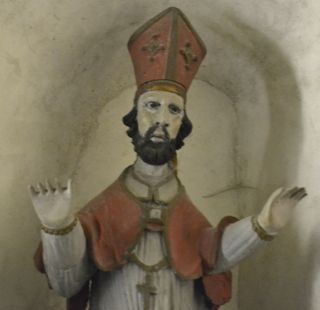Saint Point. I have to laugh about that name. Who is this ‘heilige punt’ as we Dutch would translate this name. No idea!
One of the fascinating things about the French is that they love to name their villages and towns after saints. A quick look in our ‘Big Easy Read France 2013’ learns that about one sixth of all French towns (and villages, and hamlets) are named after saints. This is almost incredible. And who is the most popular saint? Well, as far as I could see it is Saint Martin, the first real own saint of France, with about 200 towns and villages named after him.
Saint Point has its own little Romanesq church, with a pastor of Ars and a real good sculpture of another saint, don’t know his name. But most of all it is the place where Alphonse Lamartine lived. Alphonse who? ask the people that have been dosing off at their classes of French history?
Well, I didn’t know about him either – although his name ‘rang a bell’ as we Trivial Pursuit players call it – but we learned quite a bit about his life in the little tour we took in his castle, here in St. Point.
‘His’ castle is already stretching it. The castle was built in the 12th century as a protection for the abbey of Cluny, which was the function of most castles from that time in this area. After the French Revolution all these castles were confiscated and later sold on. The father of Alphonse bought it around 1800.
Lamartine, the son, is a role model avant la lettre. He is the godfather of the (shortlived) second Republic and was instrumental in the abolition of slavery, the universal suffrage – this meant that all men could vote from 1848, when I asked our female tour guide if this ‘universal’ also included women, her answer was “non, non, non”, after which she started to discuss with the other female visitor (it was a tour of four) when women were allowed to vote in France. I think they conluded it was 1948, which makes La France the backwards countrythat it is.
He instigated free primary education for everybody, had a hand in the first train lines in the country, mainly – it seemed like – to have a faster ride to Paris from his favourite hiding ground at Saint Point. And he also made sure that the death penalty for political crimes was abolished. An amazing fellow, this Lamartine.
He was a political guy, but he didn’t like compromises (if I understood our tour guide well.) This is a contradiction in terms, it seems to me, but it made him give up public political life when he was defeated for the presidency in 1852. The cousin of Napoleon defeated him (to Lamartine’s enormous disgust.).After that he focused on a writer’s life. One may assume most of the sixtysome volumes of his leatherbound collected works were written in the last fifteen years of his life.
Which didn’t mean there was no time for entertainment in his castle. In the lovely, cosy and relatively small dining room that we saw he entertained friends like Frederic Chopin, George Sand, Victor Hugo and Frans Liszt. I also thoughtthe guide mentioned Monet, but when I asked about that she denied it, excusing herself for her fast talking, ‘otherwise I forget what I want to say’ which is as good a reason for talking fast as I can imagine.
He wrote history, he wrote children stories, he wrote pulp fiction, he wrote thousands and thousands of letters in an immaculate handwriting that makes one wonder if clear thinking doesn’t get lost with clear writing. This is mainly a question I ask myself when I try to go through my Ray Walker interview notes that hardly make any sense.
But he mainly wrote poems. They aren’t popular anymore. ‘Way too Romantic’, according to our tour guide. Julie read a translation of a poem, Le Lac (the lake) to me. About a girl he saw at the lake and who died before they could meet again. Pretty dramatic stuff, but that’s how Romantics view life.
The castle itself was being renovated. The last Lamartins had left in 2003. Not real Lamartins, because the two children of Alphonse and his wife died in infancy. In the church is still a bench, especially dedicated to the Lamartin’s. Julie sat in it. It suited her well. She might have considered herself a countess for a while. After that I dragged her back to this bloody cold campervan. That is how cruel life can be. But we have to look at it from a Romantic side, in which suffering, of course, is a blessing.
14 oct

Share


Evelyn Rezac says
I never heard of this Saint, are you sure he’s Catholic?